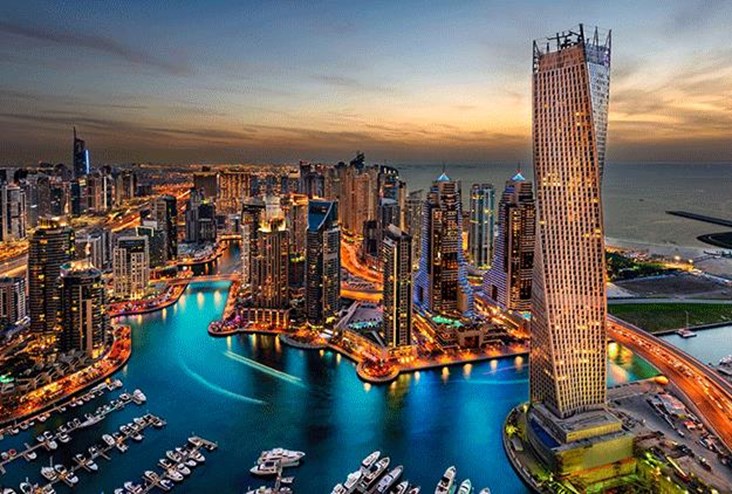
ICT infrastructure is and will continue to be a priority in supporting the development of smart cities across the Middle East. In the region's fast-track to the digital age, Dubai is bent on taking the lead. A number of technology-oriented startups consider the city the epicenter of innovation and have already chosen to move in. According to them, Dubai could become the next Silicon Valley. Among those, Tint, a social media engagement platform, chose this destination for its first international expansion.
In 2015, the Middle East will surpass Latin America in social network audience size, ranking second worldwide behind the Asia-Pacific region. 36% of web users are aged between 18 and 24, accounting for the highest percentage per capita among young and tech-savvy audiences. 88% of the online population uses social networking on a daily basis – one of the highest rates in the world. Twitter has 6.5 million accounts in the region with 3.7 million active users producing 10 million tweets a day. In Saudi Arabia alone, Twitter has a penetration rate of 33%, the world's highest. As for LinkedIn, the number of users in the United Arab Emirates has increased to 1.6 million, registering a 45% growth in one year only.
Growth Indicators: Check
All these numbers add up to an unprecedented entrepreneurial community outside Silicon Valley, and it is already starting to pay dividends for early-movers. Across the Middle East, efforts are converging to nurture this landscape and pave the way to a future of powerful economies.
In 2009, Maktoob, the first Arabic/English email service provider, was acquired by Yahoo for $175M, proving there is money to be made from online technologies in the region. E-commerce in particular offers some of the biggest opportunities, and the supply chain is quickly adapting to help address the challenges. Aramex in logistics and PayPal in payments are helping homegrown e-commerce platforms like Souq.com and Namshi de-throne more established global players like Amazon. Governments have also responded early to this evolution – they have gone from holding a monopoly on telecoms to auctioning off mobile licenses, opening up competition and dropping prices. This has created enormous opportunities for the flourishing startup scene. One of the big players in this space, Vodafone Egypt, launched an accelerator to invest $3M in early-stage startups.
More significantly, the Middle East also has no shortage of investors, an imperative for any entrepreneurial economy. These include the Jabbar investment fund, accelerators like Flat6Labs and Oasis500, and the N2V foundry. Events with a global outreach like ArabNet Summit also facilitate collaboration between technology-oriented companies and provide recognition for budding startups.
Dubai Could Pull It Off!
For the past few years, the Middle East has established itself as one of the fastest growing socially active environments. Europe and Australia might be considered more developed markets, and Tint does plan to expand there eventually. But for now, the Middle East offers greater growth potential as a fringe market with an entrepreneurial community more open to risk and the development of new ideas – core ingredients for a Silicon Valley atmosphere. With its ambition to become a smart city, Dubai was therefore a logical choice for a first destination. Owning the world’s longest driverless subway, promoting sustainable urban planning and calling for 1,000 government services to go "smart" in the next 3 years are encouraging steps in that direction.
Of course this doesn't exclude challenges. The regulatory framework can be complicated and uncertain. The local investment culture still favors hard assets, and technical talent is relatively scarce. However, the region needs success stories to inspire the next generation of entrepreneurs. By moving in, Tint has rejoined the early wave of entrepreneurs coming in from San Francisco and other technology hubs that hope to help Dubai achieve its vision. With plentiful opportunities across sectors continuing to attract brands there, social media displays around the city will become a mirror for consumers' experiences - and Tint will be the first social media hub to grab a share of this market.
More About Tint
TINT is a social engagement platform that enables brands to aggregate, moderate and display social media feeds from a wide array of sources for display on everything from mobile apps to event-sized jumbotrons. Based in San Francisco, TINT was founded in 2013 by three University of Southern California graduates and blossomed into a multimillion-dollar company in less than a year. The company’s twenty-member “Team TINT” currently counts more than 45,000 brands around the world including automakers, restaurants, sports teams, hoteliers, e-commerce brands and brick-and-mortar retailers. Constant innovation, transparency and authenticity have enabled TINT to prosper in the crowded social media arena. For more information visit www.tintup.com
Latest Business
Intelligence Report














